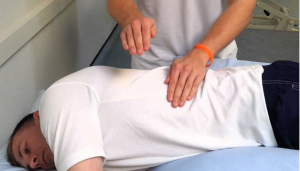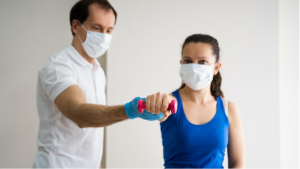
Physiotherapy & Treatment of COVID-19: Is there any connection?
The emergence of the Coronavirus (COVID-19) has made 2020 a stressful year and many have experienced setbacks related to health, social, mental, and economic crisis. During these challenging times, most have looked up to health professionals for guidance on how to manage their illnesses during the pandemic and it’s especially important that we understand what our front-line practitioners can do to help us through these difficult times. Physiotherapists also play a critical role in the rehabilitation of patients with COVID-19.
In this article, we shall discuss the various roles Physiotherapists play to help during COVID-19 as well as touch on why it is important to continue Physiotherapy treatment through these precarious times.

Source: The Conversation
Respiratory Physiotherapy for COVID-19 patients
As part of the family of practitioners that accept patients on a first contact basis, Physiotherapists are in a position to help reduce the transmission of COVID-19, assist in early identification of symptomatic patients for referral to appropriate management as well as deal with identified cases in the hospital, clinic and home environments.
Physiotherapists in acute hospital wards and the Intensive care units (ICU) are able to perform respiratory physiotherapy that focuses on the management of acute and chronic respiratory conditions.
Patients with COVID-19 may experience complications as a result of the viral attack on the respiratory and immune system and may develop lung infections (pneumonia); presenting with copious airway secretions that they are unable to clear independently.
When in the ICU or wards, Physiotherapists can perform percussion and vibration techniques and postural drainage to assist in the mobilization of secretions. Thereafter, secretion clearance techniques (suction, huffing, cough) are employed to remove secretions in the airway.
Physiotherapists also play an important role to prevent ICU-acquired weakness (muscular weakness that develops while recovering from acute illness) and promote rapid functional recovery through exercise, mobilisation and rehabilitation interventions to survivors of critical illness associated with COVID-19.

Source: Pretoria Physiotherapists
Physiotherapy during COVID-19 – why is it needed?
Another important role Physiotherapists play during COVID-19 is the maintenance of physical health and mobility. Physiotherapy is also very effective and helpful in treating a variety of musculoskeletal disorders and conditions.
Restrictions such as circuit breaker and stringent criteria to visit healthcare institutions have made many sway away from making essential appointments that would have otherwise benefited them during normal times. This lapse has significantly impacted many, delaying healing times, and treatment goals that they were trying to achieve.
Since the circuit breaker, we have seen a rise in musculoskeletal low back and neck pain possibly due to the increase in working from home arrangements. This incidence may be due to the prolonged working hours, poor ergonomics (desk/chair setup), and participation in inappropriate activity (exercises that you are not used to). Orthopedic conditions like cervical radiculopathy, rotator cuff injury, frozen shoulder, sciatica, osteoarthritis also require regular treatment and exercises to ensure recovery.
Treatment usually involves exercise prescription to strengthen weak muscles and improve joint ranges while enhancing core control, balance, and coordination. Manual therapy techniques (manipulation, mobilization) and electrophysical modalities (Ultrasound, Interferential therapy, Shockwave therapy) may also be used to assist in pain reduction.

Source: Physiopedia
Given what we have shared in the above segments, it is easy to see how Physiotherapy has a strong connection in assisting patients with recovery during the COVID-19 pandemic. Feel free to reach out to us should you have any queries or require any assistance.
For more information, please contact www.rapidphysiocare.com or call +65 6904 4900
Tags : Physiotherapy


